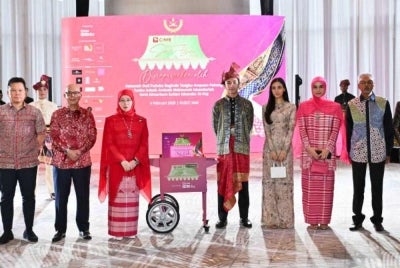Online dating: 'Too good to be true' or red flag?
Despite the numerous benefits, online dating also comes with its set of challenges and risks.
SHARIFAH SHAHIRAH
SHAH ALAM - Meeting and connecting with potential partners through online dating platforms has become increasingly common nowadays.
These platforms offer a convenient and accessible way to explore romantic connections, allowing individuals to browse profiles, initiate conversations, and build relationships from the comfort of their own homes.
Despite the numerous benefits, online dating also comes with its set of challenges and risks.
One of the primary concerns is the safety and authenticity of the profiles on these platforms.
While many users are genuine in their search for love, some individuals may create fake profiles or engage in deceitful practices. This raises the question: is online dating truly safe?
Criminologists said that not all online dating scenarios result in scams; however, if transactions become a significant part of the relationship, it may be considered a scam and a criminal offence.
They believed one of the red flags that could be observed was when profiles appear to be consistently too good to be true.
Criminologist Nadiah Syariani Md Shariff highlighted that there were many red flags to watch for, which could help prevent falling victim to scams and protect against other online threats and unhealthy relationships.
“Go through the details of the profiles, look for anything suspicious or any information that seems not to add up. Most fake accounts usually have suspicious-looking profile setups.
“It is either recently created or had a history of changing profile names multiple times within a short duration. If you go through the feeds, there are multiple posts in different settings within the same day or week,” she said when contacted recently.
Nadiah emphasised that online dating was often sought as an alternative to face-to-face dating, or for some, as a way to find a potential life partner.
Thus, to achieve this, she said users need to create a profile as their “face” for interaction.
She added online profiles were highly curated, allowing users the autonomy to choose how they want to present themselves or to remain anonymous.
She highlighted that online dating creates a "thrill" for its users by offering an unlimited number of potential partners, ease of use, minimal effort in finding a match through swipe features, immediacy to connect, and affordability since the apps can be downloaded and accessed anytime and anywhere.
Nadiah added that while these features might seem advantageous, they could also encourage impulsivity and increase the risk of users developing problematic behaviours.
“For online predators, leverage the anonymity and autonomy of the Internet to create fake identities, often a fancy one, to approach and lure victims.
“Another way to verify the identity is by checking the profile pictures using reverse image search. If the picture is taken somewhere else, it will provide you with the original image source,” she added.
She stressed that if the relationship involves any transactions, it was likely a scam and a crime and if it was not, the relationship might just be a short fling without any strings attached.
Nadiah said another red flag to watch for was if the relationship develops too quickly.
She added that fraudsters often presented themselves with similar backgrounds, such as being single or divorced with good jobs and high salaries, to create the impression that they were financially capable.
Next, when they claimed to always work overseas or offshore, using this as an excuse for why they were inaccessible by phone or video call and unable to meet in person.
Often, she highlighted these profiles feature physically attractive individuals and seemed too good to be true.
She emphasised the importance of requesting direct contacts, such as a phone call or video call or arranging to meet in person.
Nadiah said if the other person hesitated or continuously made excuses to avoid direct contact, it should be considered a red flag.
“Sometimes, the detection of language used can also signal an alarm especially if the use of language is not consistent with the demographic background that the person claimed to be,” she said.
Due to the dangers of online threats these days, Nadiah emphasised the importance of double-checking information.
She noted that the internet's easy access and quickness could lead to hasty decisions, so it was crucial to pause, reflect and then act before sharing or accepting anything online.
Therefore, she urged people to stay informed about the latest scam tactics shared by the Royal Malaysia Police, as they were often shared firsthand on official social media platforms such as the Commercial Crime Investigation Department (CCID).
Meanwhile, Unikop college (owned by the Royal Malaysia Police Cooperative) School of Investigation and Enforcement school head and criminologist Shankar Durairaja emphasised that not all online dating experiences necessarily result in scams.
He added online dating could offer a wonderful opportunity to connect with new individuals and perhaps discover a fulfilling relationship, citing numerous successful couples who initially met online.
“Online dating is a convenient way for people to meet their potential partners from all over the world without having to consider their status and other socio-demographic profiles.
“However, the cybercriminals misusing this opportunity to exploit their victims in the name of love,” he said when contacted recently.
Therefore, he recommended thoroughly researching and checking social media profiles.
Shankar said to pay attention to the profile pictures; if they appear overly professional, they might be fake.
He also suggested to use Google’s reverse search function to see if other profiles were using the same images.
He said scammers often use stock photos or images from the internet for their profiles.
Shankar stressed the importance of watching out for contradictory information in cyber sweetheart's profile and suggested verifying the details from the dating app with the person's social media profile.
He recommended attempting to verify the person's academic background and profession.
To identify red flag behaviour and ensure the legitimacy of individuals, Shankar advised caution against individuals who claimed to be stationed abroad, using this as an excuse to avoid meeting in person.
“Cyber sweetheart profile seems too good to be true. Exceptional achievements that don’t seem credible, too rich for the age, winner of irrelevant awards that have nothing to do with the person’s profile, their interests and hobbies match yours almost exactly,” he added.
He highlighted that rapid relationship development, including sudden declarations of love, swift marriage proposals and requests to move communication away from the dating site, were among the significant red flags.
Additionally, other warning signs to watch out for include inappropriate conversational styles such as copy-paste conversations, disjointed communication, and frequent grammar and spelling errors, as well as consistently avoiding video chats.
Moreover, Shankar highlighted that breaking promises to visit at the last minute, requesting money for various reasons (such as travel expenses, medical emergencies, or debts), or asking for specific payment methods were all common red flags in online dating scams.
He stressed the importance of maintaining anonymity on online dating platforms by using different usernames and email addresses to safeguard personal privacy.
“Be careful with what you make public on social media. It’s always important to take these relationships slowly, vet your new partners thoroughly and be cautious if the answers don’t match.
“Look out for warning signs. Set up a safe and appropriate phone or video chat with an online romantic partner early on to identify the real identity of that person,” he advised.
He urged people not to share compromising images and videos that could be exploited for blackmail purposes later on.
Shankar emphasised the importance of never giving money to strangers especially online, without a valid reason.
He also advised always reaching out to a trustworthy source to verify information.
Download Sinar Daily application.Click Here!














